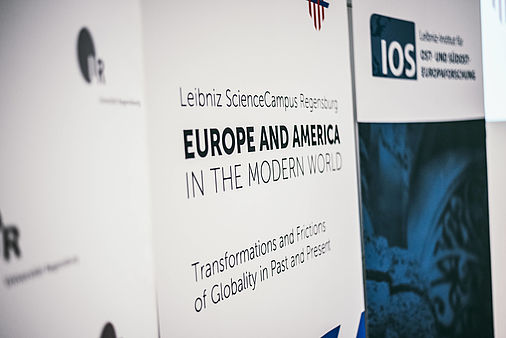Success for Area Studies in Regensburg
Bavaria’s first Leibniz ScienceCampus extended
22. March 2024
A key pillar of area studies research in Regensburg will be strengthened and expanded: The Leibniz ScienceCampus Europe and America in the Modern World has secured funding for a further four years. The Senate of the Leibniz Association announced that it has approved 1.19 million euros of funding. The Leibniz ScienceCampus is a joint platform of the Leibniz Institute for East and Southeast European Studies (IOS) and the University of Regensburg (UR). It aims to develop better understanding of the interconnections between Europe and both North and South America.
The impact of Russia’s war of aggression against Ukraine, including its significance for the USA and the Global South, or European concerns ahead of the US presidential elections: these are just two examples of how relations between Europe and America, and their meaning for the global world, are transforming. It is thus all the more important to develop better understanding of different regions on either side of the Atlantic, as well as the connections between them. This is the central objective of the Regensburg Leibniz ScienceCampus Europe and America in the Modern World: Transformations and Frictions of Globality in Past and Present. Since 2019, it has brought together researchers from various disciplines – history, cultural studies, literary studies, economics, social science, and political science. What they share is an interest in Europe and the Americas. Following a positive evaluation of the first phase of the ScienceCampus and its plans for the future, the Senate of the Leibniz Association, which funds the project, has approved an extension to 2028.

© Julia Dragan / UR
The Leibniz ScienceCampus provides a platform for research cooperation between IOS and the University of Regensburg, supporting early career researchers, and communicating knowledge to the broader public. Its aims include initiating new research projects, as well as organising public and academic lecture series exploring European-American interconnections, exhibitions and public discussions, including events addressing the war against Ukraine. Another important aspect of its work involves international exchanges, with the ScienceCampus enabling scholars from Regensburg to visit its partner institutions around the world while inviting academics from them to come to Bavaria. Its network includes renowned institutions in the Americas such as the University of California (Berkeley), the University of Toronto, the University of Michigan (Ann Arbor), and the University of Kansas, as well as the recent additions Arizona State University (Tempe) and the Alberto Hurtado University in Santiago de Chile. Its European partners include the Central European University (Budapest and Vienna), the Center for Advanced Study in Sofia, and University College London. Furthermore, the ScienceCampus will create four new positions for early career researchers.
A new focus of the second funding phase will be conflict, security and sovereignty in Europe and the Americas. Other themes include experiences of migrants and refugees, or global and regional supply chains. The ScienceCampus will also develop more digital teaching materials and courses, as well as reference works for area studies.
“The Leibniz ScienceCampus is not only an important element in Regensburg’s successful area studies research, but also forms part of the strategic development of joint activities between the University of Regensburg and IOS, which also includes the new DAAD-funded interdisciplinary centre for Ukrainian studies ‘Denkraum Ukraine’,” says a pleased Professor Udo Hebel, President of the University of Regensburg.
The second partner of the ScienceCampus, IOS, focuses on East and Southeast Europe. Its Director Professor Ulf Brunnbauer explains: “For IOS, the Leibniz ScienceCampus is crucial for comprehending the role of the east of Europe in the world and vice versa. After all, this region has constituted a central geopolitical fault line since the nineteenth century, something that Russia’s war of aggression against Ukraine again makes clear. This war is presenting not only Europe, but transatlantic relations and indeed the entire world, with critical challenges. Together with our partners in twelve countries we want to better understand this situation.”
From April, there will be twenty-four Leibniz ScienceCampi throughout Germany. As one of the four large German research organizations, the Leibniz Association has conceived this format as a way to enable Leibniz Institutes and universities to develop thematically focused cooperations in the form of regional partnerships. The objective is to create networks to drive the respective research fields and to strengthen the scientific environment for the relevant themes. The Regensburg platform is the first Leibniz ScienceCampus in Bavaria.
Information/Contact
Scientific contact person:
Dr. Paul Vickers
Managing Director Leibniz-WissenschaftsCampus „Europa und Amerika“
Phone: +49 (0)941/943-5964
Mail: campus@europeamerica.de
Media contact:
Franz Kurz
Public relations Leibniz-Institut für Ost- und Südosteuropaforschung
Phone: +49 (0)941/943-5428
Mail: presse@ios-regensburg.de




